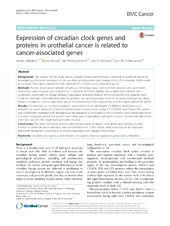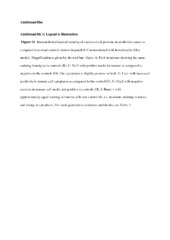| dc.contributor.author | Litlekalsøy, Jorunn | en_US |
| dc.contributor.author | Rostad, Kari | en_US |
| dc.contributor.author | Kalland, Karl-Henning | en_US |
| dc.contributor.author | Høstmark, Jens G. | en_US |
| dc.contributor.author | Laerum, Ole D. | en_US |
| dc.date.accessioned | 2016-08-09T12:58:38Z | |
| dc.date.available | 2016-08-09T12:58:38Z | |
| dc.date.issued | 2016-07-27 | |
| dc.Published | BMC Cancer 2016, 16:549 | eng |
| dc.identifier.issn | 1471-2407 | |
| dc.identifier.uri | https://hdl.handle.net/1956/12530 | |
| dc.description.abstract | Background: The purpose of this study was to evaluate invasive and metastatic potential of urothelial cancer by investigating differential expression of various clock genes/proteins participating in the 24 h circadian rhythms and to compare these gene expressions with transcription of other cancer-associated genes. Methods: Twenty seven paired samples of tumour and benign tissue collected from patients who underwent cystectomy were analysed and compared to 15 samples of normal bladder tissue taken from patients who underwent cystoscopy for benign prostate hyperplasia (unrelated donors). Immunohistochemical analyses were made for clock and clock-related proteins. In addition, the gene-expression levels of 22 genes (clock genes, casein kinases, oncogenes, tumour suppressor genes and cytokeratins) were analysed by real-time quantitative PCR (qPCR). Results: Considerable up- or down-regulation and altered cellular distribution of different clock proteins, a reduction of casein kinase1A1 (CSNK1A1) and increase of casein kinase alpha 1 E (CSNK1E) were found. The pattern was significantly correlated with simultaneous up-regulation of stimulatory tumour markers, and a down-regulation of several suppressor genes. The pattern was mainly seen in aneuploid high-grade cancers. Considerable alterations were also found in the neighbouring bladder mucosa. Conclusions: The close correlation between altered expression of various clock genes and common tumour markers in urothelial cancer indicates that disturbed function in the cellular clock work may be an important additional mechanism contributing to cancer progression and malignant behaviour. | en_US |
| dc.language.iso | eng | eng |
| dc.rights | Attribution CC BY | eng |
| dc.rights.uri | http://creativecommons.org/licenses/by/4.0/ | eng |
| dc.subject | Circadian clock genes | eng |
| dc.subject | Casein kinases | eng |
| dc.subject | Oncogenes | eng |
| dc.subject | Tumour suppressor genes and cytokeratins | eng |
| dc.title | Expression of circadian clock genes and proteins in urothelial cancer is related to cancer-associated genes | en_US |
| dc.type | Peer reviewed | |
| dc.type | Journal article | |
| dc.date.updated | 2016-07-28T06:05:06Z | |
| dc.description.version | publishedVersion | en_US |
| dc.rights.holder | Copyright The Author(s). | |
| dc.identifier.doi | https://doi.org/10.1186/s12885-016-2580-y | |


